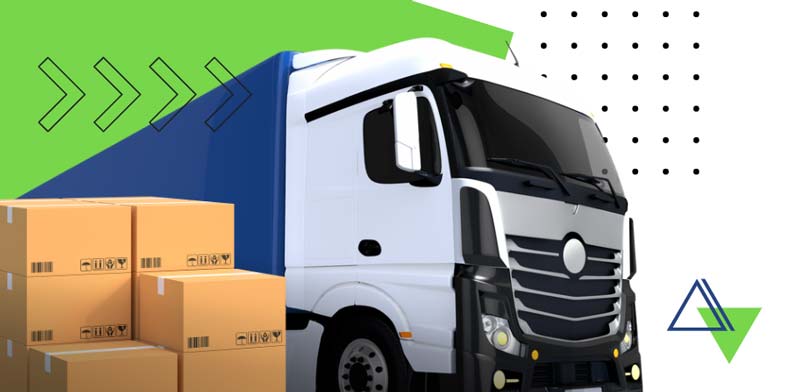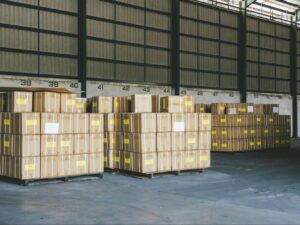When a business is selling to another business, why outsource order fulfillment? Well, there could be many answers to that question. Could be efficiency, cost savings, speed, reliability, or customer satisfaction. Warehousing and shipping B2B orders is costly. If the business no longer has the space or the staff, or if the effort becomes too great, the business may benefit from outsourced B2B order fulfillment.
What is B2B fulfillment? Simply put it is when business #1 receives an order and ships the ordered products to business #2. Outsourcing would mean that a fulfillment company stores the products in its warehouse; it receives and ships the orders rather than the company warehousing and shipping its own products.
There are a great number of benefits to outsourcing fulfillment, which we will go through, but first, let’s understand the B2B order fulfillment process. B2B is business to business. Comparatively, B2C is business-to-consumer fulfillment. Business orders are larger and handled differently than B2C. B2B covers a vast array of businesses that sell to other businesses via eCommerce or electronic data interchange (EDI).
Whatever you see in your local boutique, or your big box store, got there from another business through a B2B fulfillment process.
The Third-Party Logistics Partner
What is outsourced order fulfillment? When a fulfillment provider, sometimes referred to as a third-party logistics partner, receives, warehouses, takes orders, and ships products from one business to another it is engaged in B2B fulfillment. This involves a fulfillment company that has warehouses with appropriate space and a highly efficient warehouse management system, and inventory management system, full capacity for electronic data interchange (EDI), customer service staff, and a highly experienced shipping team with great carrier relationships.
A B2B provider will likely be a full-service fulfillment company handling both B2B and B2C, with all of the services required for success in both. Shipping wholesale orders to retail businesses that in turn sell in brick-and-mortar stores is the most common form of B2B fulfillment. There are also B2C eCommerce companies that order from wholesalers as well. Some B2B warehouses operate like distribution centers, and some, as said, are full-service companies that handle both types of commerce.
Wholesale orders may be the main part, but it is just one type of fulfillment client. A company may order in bulk and the third party logistics partner will break down freight into smaller quantities and ship these. One example would be an office supply order where smaller quantities of various products are combined into a larger order that would ship by freight. There could also be smaller orders that ship monthly, utilizing the same carriers as B2C.
Business-to-business shipping is quite different than business-to-consumer in that there is quite a lot more paperwork involved, EDI communications, labeling requirements to meet, shipping partners are different, order deliveries must be during business hours as pre-arranged, and so forth. Customer service is different of course and there are more requirements. What would be the benefit of outsourcing fulfillment is clear when looking at what fulfillment services provide.
Outsourcing Fulfillment Services

To understand outsourcing fulfillment services, let’s look at how B2C, business to consumer, is different than B2B, business to business. Fulfillment for B2C is likely what most people consider fulfillment services. A person orders a product online, the order simultaneously goes to the business and to the fulfillment company, the fulfillment company picks the product and packs it, the package is labeled and the shipping team gets it shipped with the appropriate carrier according to the order and time frame. That’s the B2C fulfillment process in a nutshell.
The distinctions between B2C and B2B are that for B2C consumers usually get a small number of products in a package and one or a small number of packages. The packages probably weigh less than ten pounds, even more likely less than one pound. But of course, there are some heavier ones. These products will require a label with appropriate information, but not a lot of other paperwork. The order will likely ship by UPS, FedEx, USPS, or another appropriate common carrier. The fulfillment company will likely have a sizable number of eCommerce clients and will fulfill a large number of orders.
The B2B order, on the other hand, will be a bulk order. It may be one product or several palletized products. There will be significant paperwork involved including and labeling and coding requirements. The shipping will typically be less than truckload (LTL) freight. And there are other differences. Delivery of these orders is quite a lot different as the business-to-business order must be delivered during business hours and follow a delivery process, whereas the business-to-consumer package is simply dropped off at the door of the consumer, in most cases without a signature required.
The B2B fulfillment services company has systems in place to meet the specifications of their client, including the labeling, coding, and invoicing requirements. There will be EDI requirements for the exchange of business and shipping documentation, sometimes extensive. Large retailers will have protocols that are strict and comprehensive, and the B2B fulfillment company will be set up to process these orders.
Some small business-to-business commerce can be handled by primarily B2C fulfillment companies if there are just a few wholesale orders to small shops as small shops will most likely not have the strict inbound requirements. Smaller orders can often be shipped by common carriers, simplifying the process. If a business does ship orders to big-box retailers they will need a fulfillment company capable of this type of B2B fulfillment. When the orders need to be shipped, via freight through LTL (less than a truckload) or FTL (full truckload), orders having complex requirements, then the skills and services of a B2B fulfillment company will be needed, as getting the paperwork wrong can be costly.
Wholesale eCommerce is a market that is growing, as online retailers are adding stores online for wholesale buyers. Customer service for B2C sellers is a very important part of the process, so B2C clients will often utilize the fulfillment company’s customer service team. B2B purchases usually require a smaller customer service team. With both B2C and B2B sellers, customer service and customer satisfaction is primary.
The Fulfillment Center Should Be a Fulfillment Partner
There are fulfillment centers that handle only B2B shipments, and there are fulfillment centers that handle only B2C. There are primarily B2C fulfillment services that do a small amount of B2B orders, and there are fulfillment centers that do both and are fully experienced and staffed and trained and capable of doing both. These will be referred to as full-service.
As we said, wholesale eCommerce is a growing market and companies selling wholesale are turning to the third-party logistics partner. To answer the title question, what are the benefits of outsourced b2b order fulfillment, we will review what is involved.
B2B & The Fulfillment Process

The fulfillment center will be shipping to brick-and-mortar locations. For this to occur properly, and for the customers to be satisfied and the clients served, there is a somewhat detailed fulfillment process.
Strict attention was paid to routing guides, meeting the end customer’s requirements. This will involve electric data interchange (EDI) communications, advance shipping notice confirmations (ASN), all required data on all paperwork, max pallet dimensions, labeling of the product or carton, or both. And there is more – truck scheduling and the meeting of deadlines and delivery windows. The fulfillment company will have, as its primary concern, a satisfied end customer. This is the outcome that benefits its client, which speaks to the partner relationship.
There is a very wide variety of businesses utilizing outsourced b2b order fulfillment. Fulfillment centers fulfill orders for large chain stores like Walmart, Target, and others as well as large department stores, other retailers, and large eCommerce entities such as Amazon, and they ship to these entities as well. A fully capable fulfillment process will include a combination of retail data distributions, pre-book and at-once orders, pre-paid order cross-dock programs, and full pallet cross-dock programs. Also, we must include case pick programs and loose pick programs. Handling all of this is a warehouse management system, and for B2B fulfillment, and all fulfillment, the warehouse management system must be created by an in-house team.
Wholesale order fulfillment is complex and nuanced. First and foremost, the fulfillment center will avoid costly chargebacks by full compliance with routing guides. They will perhaps need to pick and pack to store and send to a distribution center (DC) or distribute bulk products to the DC. The fulfillment center may need to route orders through retailer portals and adhere to ship windows. The company will always need to generate and apply compliance labeling and sometimes use retailer price stickers, barcodes, and hangtags. And finally, the company will make sure that advanced shipping notices are transmitted on time and accurately. All of this and more will be overseen by the fulfillment company’s client services team and facilitated by the warehouse management system.
A full-service fulfillment center will be able to provide back-office administration, which is a model in which the fulfillment company handles customer service and saves the sale, inventory allocation management, and more. This is a true fulfillment partner and one which many clients prefer.
When to Choose Outsourcing Fulfillment Services
Now that you have seen some of the potential benefits of outsourcing fulfillment services, we can look further into the outsourcing choice. Handling fulfillment in-house can be a serious drain on a seller, taking time and resources. Some wholesalers would prefer to focus on growth and product development, with the fulfillment operation something they would consider outsourcing if the right fulfillment partner could be assured.
There are some basic questions. The seller will need to have data on their most popular items, how often they get ordered, in what amounts, what they need to have in stock, and how fast their business customers want products delivered. These facts will be needed when preparing to outsource. The fulfillment center may have minimums and sellers need to have enough consistent volume. The seller or wholesaler, doing their own fulfillment, will need to look into the fulfillment provider’s minimum charges to cover overhead, and make sure the cost is something they can meet.
The wholesaler will no longer be in control of every detail, and for some, giving responsibility for inventory and shipping to another company can be difficult. Trusting the fulfillment company to handle all aspects of fulfillment is the reason to look for a true fulfillment partner. It can be a very big change. The onboarding process does take time and should take time. The conversation needs to be had about all of the details, for both partners want a relationship that works.
So, why outsource order fulfillment? What are some indications that it’s time for outsourcing fulfillment? Of course, number one would be that the company has outgrown its infrastructure and capabilities. Is the company meeting its performance goals? Is the warehouse missing deadlines? Have the sales channels increased? Is the company having difficulty with multichannel fulfillment? Not meeting the shipping windows? Need to make capital investments? Is the company entering new markets or launching new products? Does the business have difficulties or serious challenges during peak season?
If the company is growing, or if any of these issues are predicting the need, it’s time to look at outsourcing order fulfillment.

If warehousing and fulfillment are not the core competencies of the business, outsourcing fulfillment may be the answer to keeping competitive. By outsourcing order fulfillment to a full-service fulfillment company, expert in both B2C and B2B, the company can build, and rely on the fulfillment experts for service quality and operational efficiency. Finding the right partner for fulfillment services is challenging and may take some research, interviews, efforts, and study. The right fulfillment partner will have what the company needs and provide what is the ultimate goal… customer satisfaction. The chosen fulfillment services partner should be not only a partner but a competitive asset.
Does the size of the fulfillment center matter? Is bigger better? As always, the answer can be yes in some cases and no in others. If the fulfillment provider has warehouses on both coasts, that may translate into shipping cost savings. The company needs to scale when needed, so having a national scope is good. But if the company has thousands and thousands of clients there is a risk of getting lost in the crowd. The business should, first and foremost, carefully consider its needs and projections.
Business-to-business (B2B) fulfillment has very specific needs, and if the company also sells business to consumer (B2C) this will narrow the field. The fulfillment company must be set up to meet the needs of the clients. If the business sells to consumers who want two-day shipping, multiple warehouse locations are a must. The bigger fulfillment company will likely have the best carrier rates if customers want free shipping. Also a mid-size to large fulfillment company will be able to scale and support growth.
The best fulfillment provider will not be too small, even though the small company will seem more personalized, and it will not be too big, causing the business to be lost in the crowd. Nowadays many retailers are selling both B2B and B2C so the fulfillment company having this capacity is vital. Some fulfillment companies that handle both do limit their B2B fulfillment. Retailers who sell B2B and B2C should look for a fulfillment center that does not limit their B2B fulfillment.
Finding the Right Fulfillment Services
Choosing the right order fulfillment services center involves truly getting to know the fulfillment center, through and through. Get to know not only the provider’s capability, but their interest in collaborating, partnering, and meeting the needs now and in the future. Research, make a list, and narrow it down. What is the fulfillment center’s employee retention rate and how do they treat their employees? Experienced employees who enjoy their work are very valuable because of their experience. B2B fulfillment is complex, and trained and satisfied employees translate into satisfied customers for the fulfillment client.
There definitely needs to be site visits to meet the people who make the fulfillment process work. Ask questions, understand the technologies and tools they use. Go in with a solid idea of what is needed concerning expertise, culture, services, throughput, and technology.
The introduction and onboarding process takes time and effort but it needs to be so. The fulfillment company needs to be viewed as a strategic partner. The retailer outsourcing fulfillment should set reasonable goals and KPIs. All conversations and information exchanges should be forthcoming and collaborative. When time and effort are put into onboarding the odds are that a good partnership will be established, and both the retailer and the fulfillment center will consider the relationship a success.
How Much Does Outsourcing Fulfillment Cost?

Since prices are customized for all clients, and all client needs are different, we will go through the areas where there will be fees. To look into these areas we will use an example a mid-sized bi-coastal fulfillment company, AMS Fulfillment. We will feature how they determine cost:
One-Time Setup Fees
There will be one-time setup fees, which will vary. This fee will be determined in the onboarding process, based upon the retailer’s requirements. So the first cost would be for setup. For AMS Fulfillment, the setup fees include IT integrations between the retailer and fulfillment center, the Client Service setup, training, and operation facility configuration.
Receiving Inbound Products
The next fees will be for receiving inbound products. At AMS and likely most fulfillment companies, receiving is billed at an hourly rate but can also be transactional by carton, pallet, unit, and/or container. There are significant tasks involved in receiving as everything must be counted and inspected for damage. Accuracy is vital here and it will save money in the long run as it means having the right amount of product in the right warehouse location.
Pick & Pack Fees
Pick and Pack fees are different for B2C and B2B and B2B orders have a different fee structure. This is due to variations in B2B order picking specifications. The picking could be done at the store level or there could be full pallet pulls. Also, there are various requirements for routing compliance documentation. AMS Fulfillment specializes in B2B orders, and they know that picking and packing for B2B may require material handling equipment and more time than B2C. B2B orders require a knowledgeable, trained team. AMS has many years of experience in handling this fulfillment process including international.
Storage Fees
Storage fees are charged based on the amount of square footage the products occupy. If temperature control is needed, the fees will increase. Something very favorable about AMS is that they do not charge peak-season storage fees. Some companies do, and potential clients need to be informed as to whether peak season storage fees will be charged.
Kitting & Assembly Costs
Kitting and assembly costs are primarily for B2C fulfillment and they are quoted on a cost-per-kit basis. The situation is similar for materials fees and packaging. AMS Fulfillment does use eco-friendly packaging while many fulfillment companies do not. Return management is an add-on fee that applies to B2C fulfillment primarily as well. Outbound shipping is another area where B2C fulfillment has the most variation. B2B shipping is primarily by freight and AMS is very experienced at B2B shipping. The shipping team is skilled at negotiating to lower shipping costs as much as possible and handling extensive documentation.
Customer Support & Account Management Fees
Finally, we come to customer support and account management fees. This cost will typically be a monthly flat fee, covering B2B retail routing and customer service inquiries. Other administrative costs and incidentals will be included, such as setting up new order channels, special operational projects, and so forth.
At AMS Fulfillment, and other fulfillment companies as well, cost pricing is customized. During the onboarding process, costs are discussed and AMS, as a fulfillment partner, ensures that the costs are fair and their client receives the best possible fulfillment and shipping rates.
About AMS Fulfillment
AMS has been in the business of fulfillment for more than twenty years. The company is mid-size and full-service, experienced at serving many types of companies outsourcing order fulfillment. The company has offices and warehouses on both coasts with the headquarters in Valencia, CA. As a full-service fulfillment center, there are many tasks that AMS handles including value-added services, business processing, customer service, and much more. AMS is truly full service – large enough to handle the big tasks and small enough to give personal service to their clients.
AMS is a B Corporation, which very few fulfillment companies are. The B Corporation values have to do with the company valuing more than profit. AMS offers many benefits to its employees, including free college-level education and skills training and DE&I in hiring and promotion. AMS also considers the surrounding community to be a stakeholder, engaged in hiring individuals who might otherwise have difficulty finding work.
Environmental awareness is another feature of AMS. All of AMS’ materials are bio-degradable and the company fully engages in recycling. We are also “green” as well in energy usage and are committed to being carbon neutral soon. Our clients are also stakeholders in the business. AMS Fulfillment believes in being the change and that includes full partnership with clients.
If you are interested in outsourcing fulfillment services, whether B2B or B2C, please Contact Us today!
GET IN TOUCH
Ready to reap the benefits of Outsourced B2B Order Fulfillment?
LET’S CONNECT




